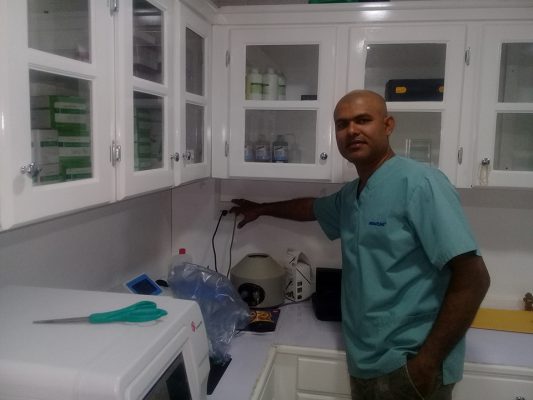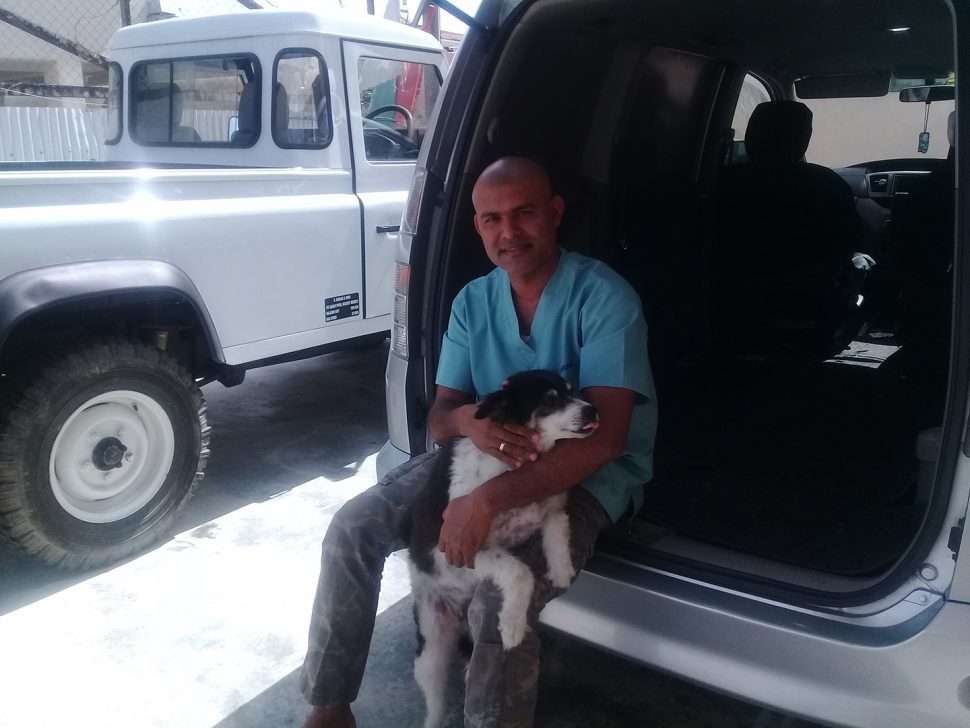When Nardeo Bassoodeo was a nine-year-old boy living in Woodley Park-Bath Village, Mahaica, Berbice, his dog Rio fell ill and needed veterinary assistance. The vet lived next door, but the little boy did not have the $5 to pay for an examination. He was told not to waste the doctor’s time and Rio subsequently died.
It was at that age as he grieved for his dog that he decided that he wanted to become a veterinarian. Not only he did not “want another little boy to experience what I went through” but he also knew that vets were in demand and he saw the suffering of animals every day and wanted to help.
Today that little boy’s passion still burns in Dr Nardeo Bassoodeo and he has been on a mission to assist animals, especially strays. His career has evolved over the years with him now owning one of the most modernized veterinary clinics. His Prashad Nagar, Georgetown clinic—NB Veterinary Services—is not only equipped with an x-ray room but he also has what is known as a digital mobile x-ray machine which produces almost immediate images which can be sent to consultants overseas instantaneously. There is also an operating theatre with a 2018 model operating table which is equipped with an electronic pad that controls the temperature of the table. The animals can be administered oxygen and saline. Blood work and dip slides to measure and observe microbial activity are also done on at the clinic as well as injections and a range of medication is available.

On any given day, Bassoodeo could be attending to a dog, a cat, a snake, a monkey, or even a macaw as a variety of animals are taken to his clinic. Interestingly, he also looks after horses, especially race horses, and while he visits most of them, there are a few that are taken to the clinic. The clinic, which also has two staff members, can see about eight to ten patients a day and these can come from as far as Crabwood Creek, Lethem or Mabaruma.
What Dr Bassoodeo’s clinic offers, unlike many others, is diagnostic services without which he said vets would not be able to function to the fullest of their capacity. He noted that his clinic also has a laboratory, a small ultrasound machine and that skin biopsy among other services are available. Safety is also a priority of the clinic.
Dr Bassoodeo has been in private practice for some years but prior to this he worked in several regions under the government as a veterinary extension officer. He was also attached to the Guyana Wildlife Office where he had done quarantine for all animals that left the country. He also worked at the Guyana Zoo.
“Sometimes people come to my clinic and they would say I don’t have the money to do this… and we just do it for them because I know what I went through,” the doctor said, referring to how he felt when his dog Rio passed.
He currently has 14 dogs, but they live at different locations. The four who reside with him can be found in his home.
“I don’t have a kennel for dogs. I don’t believe in kenneling dogs. They need freedom,” he told the Sunday Stabroek, adding that he has a veranda at the back for the dogs and they are also free to enter the house.
He shared that the veranda where the dogs dwell in disinfected every day and they are taken into the yard at specific times but spend their nights in the yard because they are guard dogs. He boasted that they “are very well potty trained”, pointing out while his entire yard is concreted there are two spots with grass for the dogs to defecate and urinate and it has worked out fine.
Among the four is one called Brutus who is special to Bassoodeo as it was through his parents that the doctor met his wife Devi. He said he took care of Brutus’s parents who were the pets of Devi’s family and “we became friends and after that we took it a little further.”
He said his wife is a much greater animal lover than he is. “I have a very good passion for animals, but she would go the extra mile, she would pay some really special attention to them…,” he said.
Devi does all of the importation of medicine for the clinic and according to Dr Bassoodeo without her input “we can’t do anything here because 90% of the medicine we use here in Guyana we don’t buy it locally.” They are purchased primarily from the US and some from India.
Bassoodeo uses his profession to help animals and most times it is not for the money but for the love of it. He is a consultant for Humane Society International and a member of the Guyana Society for the Prevention of Cruelty to Animals (GSPCA), where he volunteers once every three months. Animals are spayed and neutered for free, but donations are welcomed.
Prior to opening the clinic, the couple operated a pet shop and the doctor also worked as an ambulatory vet.
Stray dog population
According to Bassoodeo the stray dog population is very high in Guyana and they end up on the streets where they are abused and also go through people’s garbage making the environment unhealthy. They also contract diseases which can be passed to humans, the doctor said.
He pointed out that if people took better care of their dogs and got them spayed or neutered, they would be in a better position to take care of one dog instead of many,
Solving the stray-dog issue, he said, must be approached in a holistic manner and he gave the example of the work he has done over the years which involved tracking stray dogs and spaying and neutering them.
He has a mobile unit which he worked with but suggested an open area and some electricity where the dogs can be taken to be spayed and neutered. He still does it in Berbice and in some East Coast villages.
It was after he started the spaying and neutering with others that word of his work got to Joyce Gomes of the Humane Society and he was offered some additional training in Panama. He was trained in high-quality, high-volume, small-incision spaying and neutering. Prior to the training, he was able to take care of 20 to 30 animals a day, but can now do 40 to 50 animals, and as a result he is very grateful for the training.
The doctor was quick to point out that he does not do it alone as many persons assist and they also get a lot of help from organisations such as the Humane Society in training and medicine and there are also volunteers.
Create awareness
According to Bassoodeo, they are trying to get a team of key people to create awareness about animal welfare which is their first priority.
“I think we lost a generation of people when it comes to animal welfare because a lot of the last generation, not all of them, a lot of them, they don’t look at animal welfare,” he posited.
He said people are very cruel to animals and with a group of them are now working on engineering a change in the mentality of the next generation to have a more humane society that thinks for others in the animal kingdom.
He shared that apart from the traumatizing experience with Rio, his love for animals also developed on his grandfather’s ranch in Abary River where he could have been found milking a cow at 3 o’clock in the morning.
While he uses mostly fish, Bassoodeo said he does not have a problem with people using animal products, but he does have a problem with the way the animals are transported for slaughter and the “horrible conditions” they are reared in. “I have a problem the way they keep the animals, the way they treat animals on the road. The work horses, you see them falling down… and the guys with the donkey carts beating them and those kinds of things… The animals are going through unbelievable pain, but they can’t talk.”
He considers himself a “proud member of the animal kingdom” as he pointed out that those practice veterinary medicine measure pain in animals and they do feel pain.
At his office, Bassoodeo is the only full-time vet, but he also looking to secure the services of Dr Dorean Wilson from Linden who has already filled in for him for him twice when he left to volunteer at the GSPCA. He has his job, but he finds the time to assist. Don’t expect Bassoodeo to sell you a dog, if money is offered, he would ensure that it is used on preparation for the dog and he checks on them ever so often. “I don’t sell my animals because I can’t put a value to them because they are so valuable to me,” he said adding that he has an agreement with persons to return the dog if for some reason they are unable to take care of them. He has had several but was strategic in the homes they were placed, and he happily announced that “all of them are in very good homes.”
At one time, Dr Bassoodeo had done some work with ponies—mostly in Cuba—to conduct what is called equine therapy to assist autistic children.
A wildlife enthusiast, Bassoodeo said it is his hope that one day there will be sustainable development in all areas. “Meaning that we can have human development and advancement together with advancing the core values of our surroundings and our environment be it marine, forest, wildlife… I do know that if everyone of us plays our part we can make a better world.
A better world is possible if all of us. [If we] put our shoulders to the wheel, we can roll it together.”






